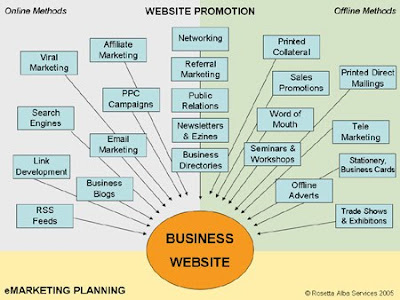Internet Marketing - e Marketing
Pay Per Click (PPC) : With Pay Per Click (PPC) advertising, a bet on the keywords you think potential customers will join the search engine to look for your products or services. For example, if you sell telecommunications services, you can auction for keywords such as "VoIP, phone systems or Internet service provider." You choose these keywords in the hope that a user enters these keywords in the search bar, see their ad, click and buy. These ads are called sponsored links or Sponsored ads, and usually appear to the natural results in a search page. Pay your ad only when the user clicks on it.
 Google Ad Words and Yahoo! Search Marketing (formerly Overture) are currently the largest PPC providers. Our job is to help you choose PPC keywords to match your business initiative, develop and place ads profitable. Interactive advertising using interactive media such as banner ads and Flash to get an active response from visitors. Promote their products and services and inform customers. If they are well designed, interactive advertising allows you to engage customers in a direct and personal, and this creates a communication other than that may affect purchasing decisions. RTN Europe produce presentations, mini websites and online advertising campaigns to help you compete.
Google Ad Words and Yahoo! Search Marketing (formerly Overture) are currently the largest PPC providers. Our job is to help you choose PPC keywords to match your business initiative, develop and place ads profitable. Interactive advertising using interactive media such as banner ads and Flash to get an active response from visitors. Promote their products and services and inform customers. If they are well designed, interactive advertising allows you to engage customers in a direct and personal, and this creates a communication other than that may affect purchasing decisions. RTN Europe produce presentations, mini websites and online advertising campaigns to help you compete.E-mail marketing: E-mail marketing, including email newsletters and online, is a form of relationship marketing based on obtaining the authorization of the client. Once people agree to receive periodic announcements about your products and services have the opportunity to turn your potential customers to existing customers, retain customers and create value for your business. We help you build cost-effective campaigns that reach e-mail directly to potential customers, strengthening your brand and establish lasting relationships with existing customers.
Marketing "White Paper”: The White Paper is designed to promote your business solutions with reference to specific topics. They also help to position your company as a leader in a given sector. The White Paper can be very effective in generating clues, which are normally distributed after having obtained the customer's contact information. Our development team can write and research content and content of this document for you. Our teams of marketing and development partners to generate and collect clues.
Blog Marketing: From the viewpoint of corporate marketing, blogs offer many advantages. First, they provide an easy way to introduce new content to your site on an ongoing basis. The presence of newly added content attracts more attention from search engines; therefore it is likely that your site has a higher ranking with a blog than without it. Our services can help you develop a blogging strategy, integrating a blog into your website or ghostwrite "your content.
More on: http://searchenginejournal.org/






